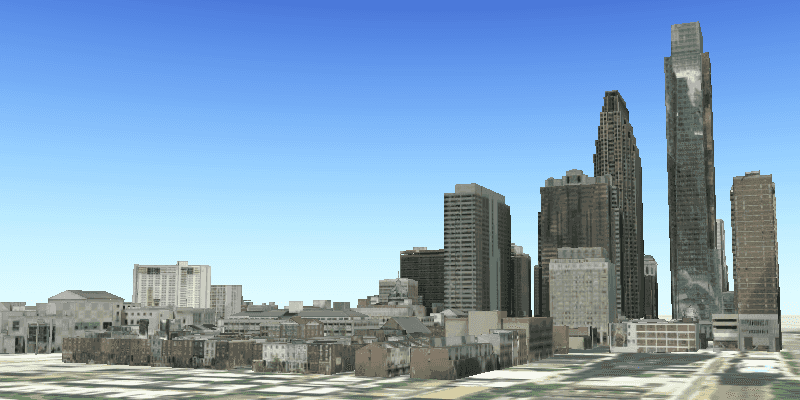Opens and displays a scene from a mobile scene package (.mspk).

Use case
A mobile scene package is an archive containing the data (specifically, basemaps and features), used to display an offline 3D scene.
How to use the sample
When the sample opens, it will automatically display the Scene in the mobile scene package.
Since this sample works with a local .mspk, you will need to download the file to your device.
How it works
- Create a
MobileScenePackageusing the path to the local .mspk file. - Call
MobileScenePackage.loadAsyncand check for any errors. - When the
MobileScenePackageis loaded, obtain the firstArcGISSceneusingmobileScenePackage.getScenes().get(0) - Create a
SceneViewand callsceneView.setViewto display the scene from the package.
Relevant API
- MobileScenePackage
- SceneView
Tags
offline, scene
Sample Code
OpenMobileScenePackageSample.java
/*
* Copyright 2019 Esri.
*
* Licensed under the Apache License, Version 2.0 (the "License"); you may not
* use this file except in compliance with the License. You may obtain a copy of
* the License at
*
* http://www.apache.org/licenses/LICENSE-2.0
*
* Unless required by applicable law or agreed to in writing, software
* distributed under the License is distributed on an "AS IS" BASIS, WITHOUT
* WARRANTIES OR CONDITIONS OF ANY KIND, either express or implied. See the
* License for the specific language governing permissions and limitations under
* the License.
*/
package com.esri.samples.open_mobile_scene_package;
import java.io.File;
import javafx.application.Application;
import javafx.scene.Scene;
import javafx.scene.control.Alert;
import javafx.scene.layout.StackPane;
import javafx.stage.Stage;
import com.esri.arcgisruntime.loadable.LoadStatus;
import com.esri.arcgisruntime.mapping.MobileScenePackage;
import com.esri.arcgisruntime.mapping.view.SceneView;
public class OpenMobileScenePackageSample extends Application {
private SceneView sceneView;
private MobileScenePackage mobileScenePackage; // keep loadable in scope to avoid garbage collection
@Override
public void start(Stage stage) {
// create stack pane and application scene
StackPane stackPane = new StackPane();
Scene fxScene = new Scene(stackPane);
// set title, size, and add scene to stage
stage.setTitle("Open Mobile Scene Package Sample");
stage.setWidth(800);
stage.setHeight(700);
stage.setScene(fxScene);
stage.show();
// create a new scene view
sceneView = new SceneView();
// create a mobile scene package from a file
final String mspkPath = new File(System.getProperty("data.dir"),"./samples-data/mspk/philadelphia.mspk").getAbsolutePath();
mobileScenePackage = new MobileScenePackage(mspkPath);
// load the mobile scene package
mobileScenePackage.loadAsync();
// wait for the mobile scene package to load
mobileScenePackage.addDoneLoadingListener(() -> {
if (mobileScenePackage.getLoadStatus() == LoadStatus.LOADED && mobileScenePackage.getScenes().size() > 0) {
// set the first scene from the package to the scene view
sceneView.setArcGISScene(mobileScenePackage.getScenes().get(0));
} else {
Alert alert = new Alert(Alert.AlertType.ERROR, "Failed to load the mobile scene package");
alert.show();
}
});
// add the sceneview to the stackpane
stackPane.getChildren().add(sceneView);
}
/**
* Stops and releases all resources used in application.
*/
@Override
public void stop() {
// release resources when the application closes
if (sceneView != null) {
sceneView.dispose();
}
}
/**
* Opens and runs application.
*
* @param args arguments passed to this application
*/
public static void main(String[] args) {
Application.launch(args);
}
}